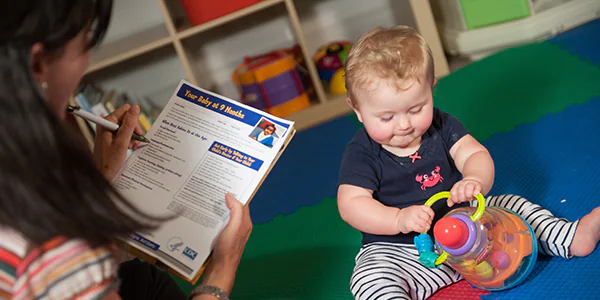Early intervention is a critical aspect of supporting a baby’s development. It involves providing support and resources to infants and young children who show signs of developmental delays or disabilities. Early intervention can significantly impact a child’s physical, cognitive, social, and emotional growth, setting the foundation for future success.
What is Early Intervention?
Definition and Overview
Early intervention refers to a system of services designed to support infants and toddlers with developmental delays or disabilities. These services aim to enhance development in various domains, including physical, cognitive, communication, social-emotional, and adaptive.
Importance of Early Intervention
- Enhances Development: Early intervention can improve developmental outcomes by addressing delays early.
- Reduces Future Costs: Early support can prevent the need for more intensive interventions later in life.
- Empowers Families: Provides families with the tools and knowledge to support their child’s development.

Signs Your Baby May Need Early Intervention
Developmental Milestones
Understanding developmental milestones helps parents recognize potential delays. These milestones include physical abilities (like crawling and walking), cognitive skills (such as problem-solving), and communication (both verbal and non-verbal).
Red Flags for Developmental Delays
- Lack of Response to Sound or Visual Stimuli: Not responding to their name or not making eye contact.
- Motor Skill Delays: Not rolling over, sitting up, or crawling by expected ages.
- Communication Delays: Not babbling, making gestures, or using words as expected.
When to Seek Professional Help
If parents notice any delays or have concerns about their child’s development, they should seek advice from a pediatrician or a developmental specialist.
Early Intervention Services
Types of Services
Early intervention services can include a range of therapies and supports:
- Speech Therapy: Helps with communication and language skills.
- Occupational Therapy: Focuses on fine motor skills and daily living activities.
- Physical Therapy: Enhances gross motor skills and physical development.
- Behavioral Therapy: Addresses social-emotional and behavioral challenges.
How to Access Early Intervention Services
Parents can access early intervention services through various channels, including healthcare providers, local early intervention programs, and community resources.
Role of Healthcare Providers
Pediatricians and other healthcare providers play a crucial role in identifying developmental delays and referring families to early intervention services.
Strategies to Support Baby’s Development
Creating a Stimulating Environment
- Safe Play Areas: Ensure safe spaces for babies to explore and play.
- Toys and Activities: Provide age-appropriate toys that promote development, such as stacking blocks and interactive books.
Encouraging Motor Skills
- Tummy Time: Helps strengthen neck and shoulder muscles.
- Reaching and Grasping: Encourage reaching for and grasping toys to develop fine motor skills.
Promoting Cognitive Development
- Reading: Read to your baby daily to stimulate language and cognitive skills.
- Interactive Play: Engage in activities that encourage problem-solving and exploration.
Enhancing Social-Emotional Skills
- Responsive Parenting: Respond to your baby’s needs and cues to build trust and emotional security.
- Social Interaction: Encourage interaction with other children and adults to develop social skills.
Role of Parents in Early Intervention
Being Proactive
Parents should be proactive in monitoring their child’s development and seeking support when needed. Early detection and intervention are key to successful outcomes.
Building a Support Network
Connecting with other parents, joining support groups, and accessing community resources can provide valuable support and information.
Collaborating with Professionals
Working closely with healthcare providers, therapists, and early intervention specialists ensures a comprehensive approach to supporting a baby’s development.

The Impact of Early Intervention on Long-Term Development
Academic Success
Children who receive early intervention are more likely to succeed academically, as early support helps develop critical foundational skills.
Social and Emotional Well-Being
Early intervention promotes social and emotional well-being by addressing behavioral and social challenges early on.
Improved Quality of Life
By addressing developmental delays early, children can achieve a higher quality of life, with better health, education, and social outcomes.
Case Studies and Success Stories
Real-Life Examples
- Speech Delay: A child with a speech delay receives early intervention and shows significant improvement in communication skills.
- Motor Skills Delay: Early physical therapy helps a child with motor skill delays achieve milestones like walking and running.
Lessons Learned
These case studies highlight the importance of early detection, parental involvement, and professional support in achieving positive outcomes.
Challenges and Solutions in Early Intervention
Common Challenges
- Access to Services: Some families may face barriers in accessing early intervention services due to location or financial constraints.
- Parental Stress: Parents may experience stress and anxiety related to their child’s developmental delays.
Overcoming Barriers
- Advocacy and Education: Educating parents about their rights and available resources can help them advocate for their child’s needs.
- Support Systems: Building strong support systems can alleviate parental stress and provide emotional support.









